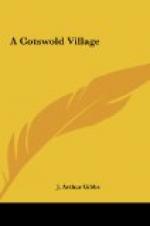“One thing of
Gaarge Ridler’s I must commend,
And that wur vor
a notable theng;
He mead his braags
avoore he died,
Wi’ any
dree brothers his zons zshou’d zeng.”
This meant that the king, “before he died,” boasted that notwithstanding his present adversity, the ancient constitution of the kingdom was so good and its vitality so great that it would surpass and outlive any other form of government, whether republican, despotic, or protective.
“There’s
Dick the treble and John the mean
(Let every mon
zing in his auwn pleace);
And Gaarge he
wur the elder brother,
And therevoore
he would zing the beass.”
“Dick the treble, Jack the mean, and George the bass” meant the three parts of the British constitution—King, Lords, and Commons. The injunction to “let every man sing in his own place” was intended as a warning to each of the three estates of the realm to preserve its proper position and not to attempt to encroach on each other’s prerogative.
“Mine hostess’s
moid (and her neaum ’twur Nell),
A pretty wench,
and I lov’d her well;
I lov’d
her well—good reauzon why,
Because zshe lov’d
my dog and I.”
“Mine hostess’s moid” was an allusion to the queen, who was a Roman Catholic; and her maid, the Church. The singer, we must suppose, was one of the leaders of the party, and his “dog” a companion or faithful official of the Society; and the song was sung on occasions when the members met together socially: and thus, as the Roman Catholics were Royalists, the allusion to the mutual attachment between the “maid” and “my dog and I” is plain and consistent.
“My dog has gotten
zitch a trick
To visit moids
when thauy be zick;
When thauy be
zick and like to die,
Oh, thether gwoes
my dog and I.”
The “dog”—that is, the official or devoted member of the Society—had “a trick of visiting maids when they were sick.” The meaning here was that when any of the members were in distress, or desponding, or likely to give up the royal cause in despair, the officials or active members visited, consoled, and assisted them.
“My dog is good
to catch a hen,—
A duck and goose
is vood vor men;
And where good
company I spy,
Oh, thether gwoes
my dog and I.”
The “dog,” the official or agent of the Society, was “good to catch a hen,” a “duck,” or a “goose”—that is, any who were well affected to the royal cause of whatever party; wherever “good company I spy, Oh, thither go my dog and I”—to enlist members into the Society.
“My mwother told
I when I wur young,
If I did vollow
the strong beer pwoot,
That drenk would
pruv my auverdrow,
And meauk me wear
a thzreadbare cwoat.”
“The good ale-tap” was an allusion, under cover of a similarity in the sound of the words “ale” and “aisle,” to the Church, of which it was dangerous at that time to be an avowed follower, and so the members were cautioned that indiscretion would lead to their discovery and “overthrow.”




